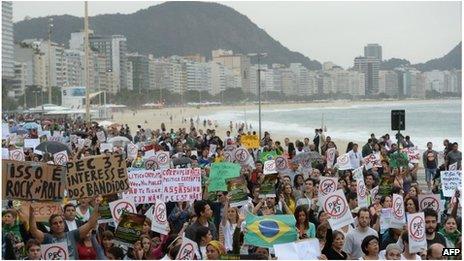Brazil protests on smaller scale in Rio and Fortaleza
- Published

Protests have resumed in several cities across Brazil, although on a smaller scale than in the last few days.
On Copacabana beach in Rio de Janeiro, thousands marched against a law change that would limit prosecutors' powers to investigate corruption.
In the north-eastern city of Fortaleza, where Spain played Nigeria for the Confederations Cup, a crowd blocked the road to the airport.
The protests began over a week ago against increased transport fares.
But they quickly escalated into a nationwide movement that took an estimated million people to the streets in more than 100 cities on Thursday.
The protesters also redirected their complaints to a wide range of issues, from corruption and poor public services to the cost of staging international football tournaments.
Brazil is currently hosting the Confederations Cup, seen as a prelude to the 2014 Fifa World Cup.
Airport blocked
On Sunday, hundreds of protesters tried to reach the Castelao stadium in Fortaleza, where Spain defeated Nigeria, but were pushed back by the police.
They then marched towards the city's airport and blocked the road for at least two hours, forcing passengers to walk.
Trouble was reported in Belo Horizonte and Salvador, the two cities hosting Confederations Cup matches on Saturday.
In Rio de Janeiro, a largely peaceful protest attracted an estimated 4,000 people who marched from Copacabana to Ipanema.
Many were protesting against a law which could curb the powers of State and Federal Attorney's offices in investigating corruption and abuse of power cases.
It was federal prosecutors who were behind Brazil's biggest-ever corruption case into an illegal scheme that used public funds to pay coalition parties for political support.
A larger protest is expected in Rio on Monday.
During the past week, some of the protests have turned violent and the police have been accused of abuse of power in several cities.
Police in Belo Horizonte said on Sunday they were expecting trouble on Wednesday, when Brazil are due to play Uruguay in a Confederations Cup semi-final tie.
Clashes broke out in the city on Saturday after more than 60,000 people took to the streets during a match between Japan and Mexico.
President Dilma Rousseff went on national TV late on Friday, condemning the violence but also attempting to respond to protesters' demands.
She is set to meet state governors and mayors on Monday to consider solutions for some of the issues raised by protesters.
- Published23 June 2013
- Published22 June 2013